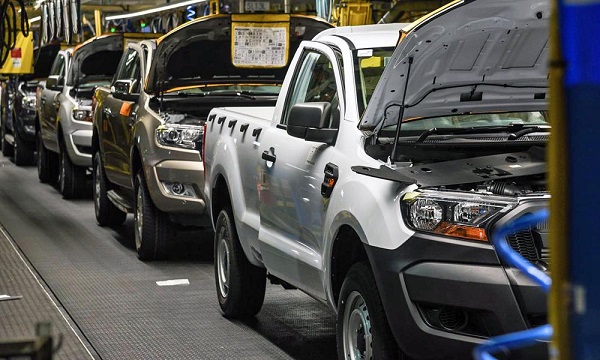Ford Motor Company of Southern Africa (FMCSA) has announced plans to invest more than $107 million to expand operations for the production of Ford’s next-generation compact pickup truck and Puma diesel engine.
The investment and new manufacturing contract will transform FMCSA’s current production landscape to enhance South Africa’s significance as a strategic export base for vehicles, engines and components for Ford Motor Company. Plans call for the Silverton, Waltloo plant to transition from its current production, to a high-volume, flexible single platform line that will accommodate the new pickup.
The investment will increase total annual capacity at the Silverton plant to 110,000 units, with approximately three-quarters of the vehicles being produced for export, primarily to markets in Africa and Europe. The Struandale Engine Plant will increase annual production for its next-generation, turbocharged common-rail Puma diesel engine and components to approximately 180,000 units, with the majority being exported.
“Winning this investment is a major achievement for everyone at FMCSA, as well as our partners in government, NUMSA, and our local suppliers, and highlights our strategic position within the future global footprint of Ford Motor Company,” explained Hal Feder, president and CEO of FMCSA. “It also underscores Ford’s ongoing commitment to expanding our operations in South Africa.”
As part of the investment, FMSCA plans to continue working with the South African government to accelerate and enhance human resources training and development of the auto industry’s current and future workforce to ensure they possess the necessary skills required to support the launch.
Both Ford and government recently reconfirmed their full commitment to future growth and development of the South African vehicle manufacturing and associated industries. This included an agreement of strategic objectives to develop worker skills, improve supply base capabilities, and accelerate the transformation of black economic empowerment.
“It’s critical for the South African government to continue to support initiatives that help foster a strong and globally competitive auto industry – one that is prepared to capitalize on future opportunities and realize the potential for growth and success,” asserted Feder. “We’ll also continue to work closely with NUMSA to ensure there is total alignment and commitment to deliver the cost competitiveness and world-class quality and safety standards that have attracted this investment.”
The transition of FMCSA operations over the next few years will have no immediate impact on the workforce size, which currently totals nearly 4,500 employees between its two manufacturing facilities. However, FMCSA expects to hire up to 500 additional employees by the time the realigned production kicks off in 2011.
Local suppliers to FMCSA stand to benefit from the expanded capacity, as increased local content will be sourced to meet increased production and output. FMCSA currently achieves about 35 percent local content, which will improve to more than 60 percent when production begins. Working with roughly 110 different South African suppliers, annual spending on local components will increase from an estimated $31.4 million each year to approximately 206.7 million.
“The magnitude of this project is indicative of how South Africa can benefit from having a globally competitive auto industry. In addition to the direct implications to FMCSA, this investment will have a multiplier effect with indirect job creation for local suppliers, and overall economic benefits from increased demand of locally produced content,” said Feder.
FMCSA is a wholly-owned subsidiary of Ford Motor Company, and first set up operations in South Africa in 1923.
About Ford Motor Company
Ford Motor Company, a global automotive industry leader based in Dearborn, Mich., manufactures and distributes automobiles in 200 markets across six continents. With about 260,000 employees and about 100 plants worldwide, the company’s core and affiliated automotive brands include Ford, Jaguar, Land Rover, Lincoln, Mazda, Mercury and Volvo. Its automotive-related services include Ford Motor Credit Company. For more information regarding Ford’s products, please visit www.fordvehicles.com.




